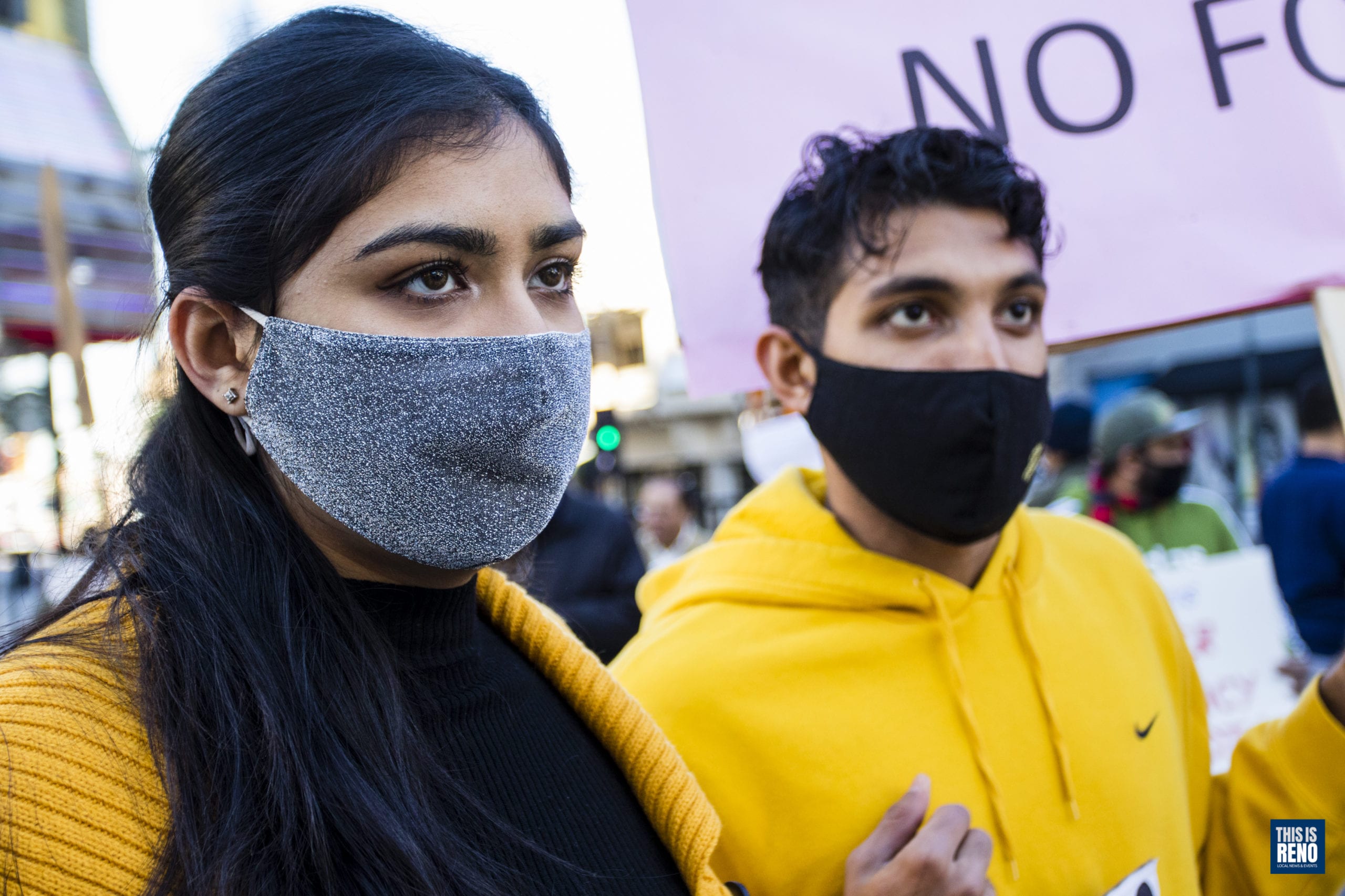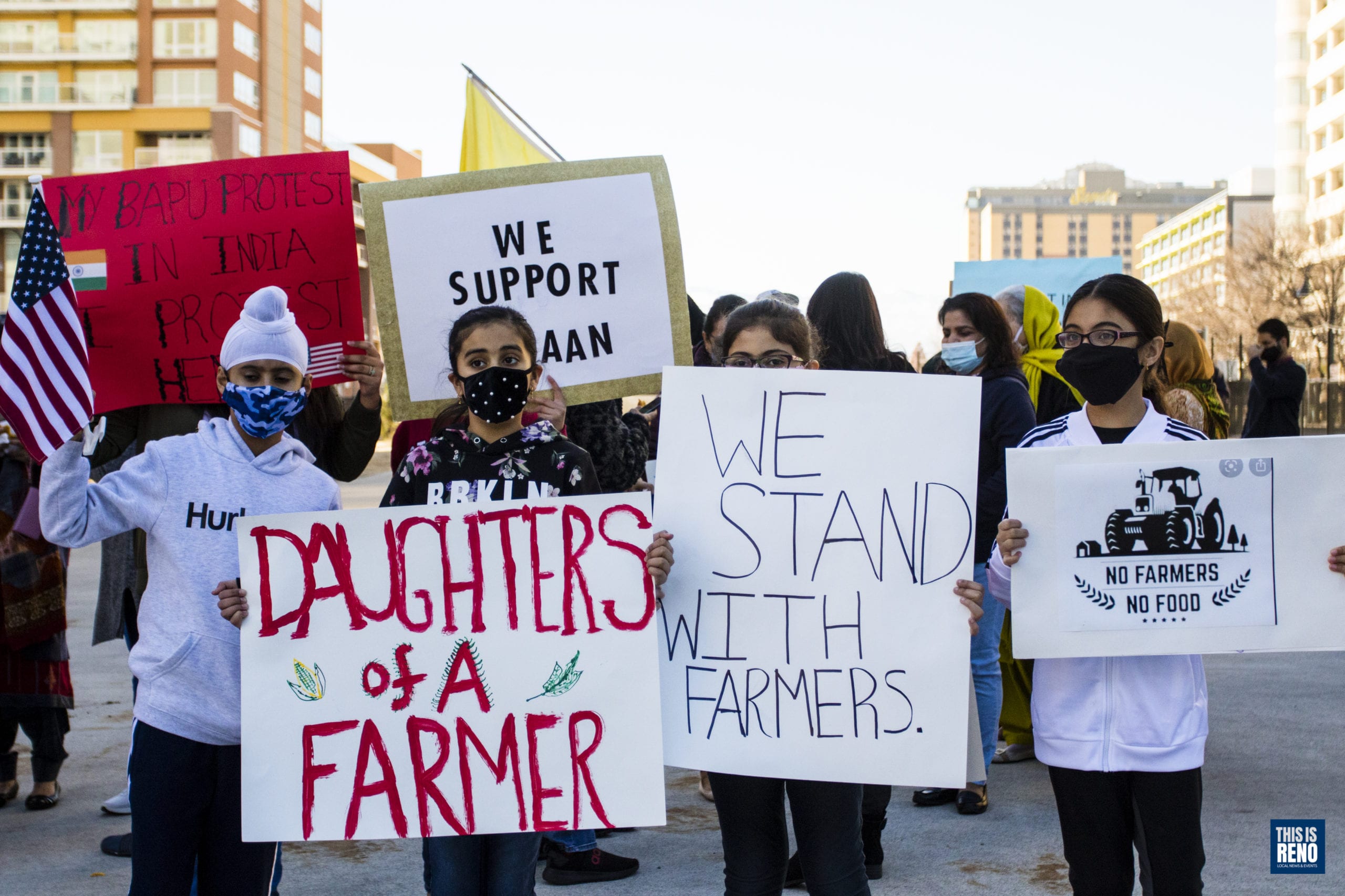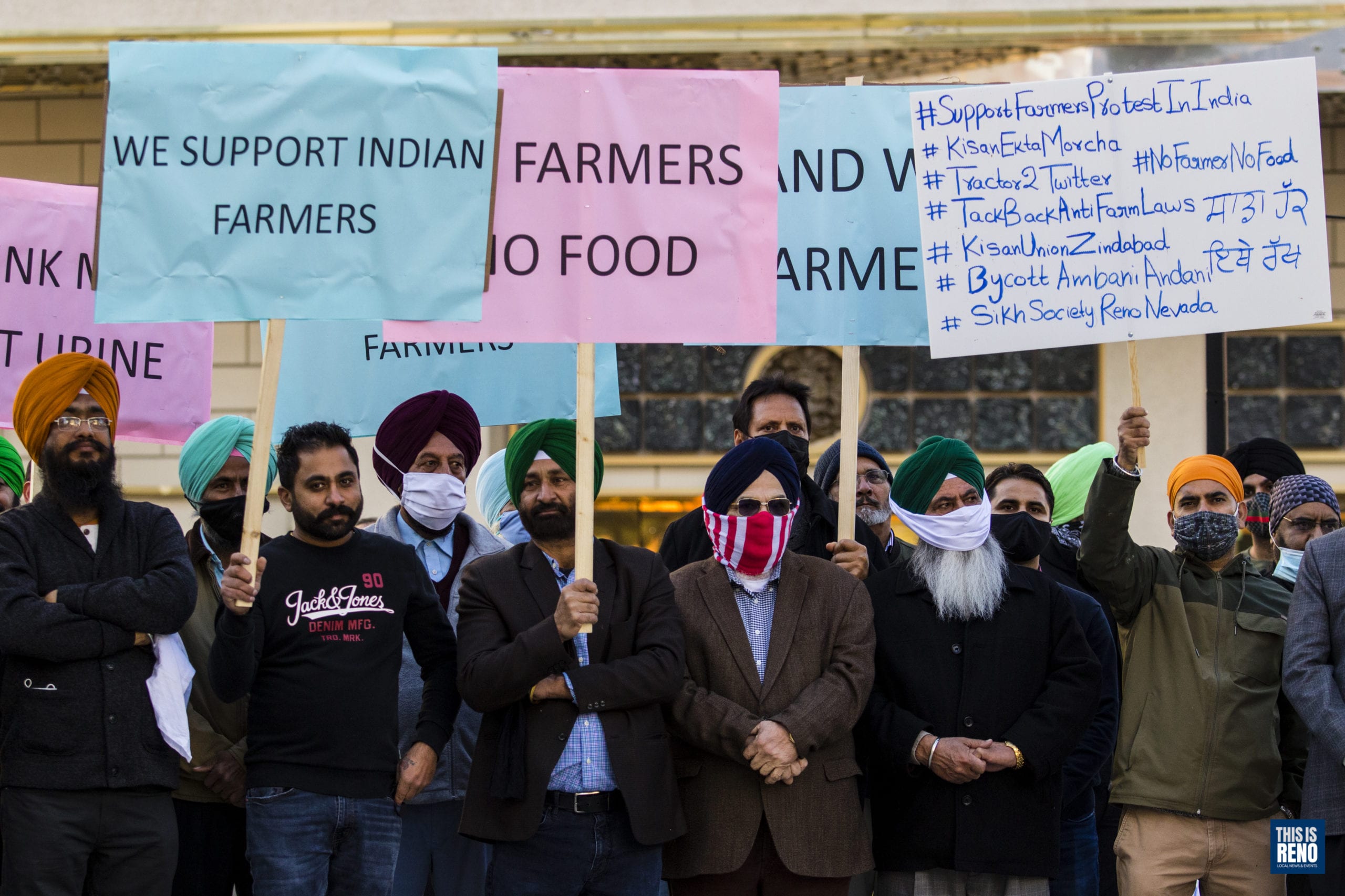About 100 people gathered Sunday at the Reno Arch downtown, wearing green, yellow and white showing solidarity with farmers protesting in the roads leading to New Delhi, India’s capital. Gathering around a flatbed trailer, protestors listened to speakers and chanted “No farmers, no food.”
In one of the biggest protests in recent times, about 10,000 farmers are protesting against farm laws which they fear will give enormous control to corporations in the farming sectors paving way for rampant corruption and deprivation of farmers.
Maneet Kaur, one of the organizers in Reno, explained that geographically distant Indians are doing their part to support the efforts of the farmers protesting in India. Protesters held signs supporting the farmers and criticizing Prime Minister Narendra Modi and the current government for the bills.
According to protesters and the farming community in India, the bills benefit the Adanis and Ambanis, two corporations that are heavily aligned with Modi’s Bharatiya Janata Party (BJP) and its economic goals since 2014 when the party came to power.
The two bills, which have now become the law, are aimed at allowing corporations to buy crops from the farmers and doing away with the long-held official policy concerning the government’s purchase of crops with a guaranteed “Minimal Support Price.” That price is set by the government to buy crops from the farmers. The government claims that this will give the farmers more choice and encourage competitions among buyers of farm goods. The farmers disagree.
Chapter IV of one of the farm bills makes it nearly impossible for farmers to litigate against government officials, corporations or any other party. Indian farmers view this legal detail as against their interests in an already struggling farming sector. More than half of India’s farmers are in debt. In 2020, over 20,000 farmers killed themselves, unable to survive the financial strain, according to data by India’s National Crime Record Bureau.
The farmers’ trust in corporations also runs low.
Since early December, farmers have been protesting outside New Delhi as the government placed concrete blocks, deployed the paramilitary and attacked the unarmed farmers with water cannons and batons.
In retaliation, the farmers decided to block the roads from parts of northern India, leading to Delhi. For about a month, the farmers have been out in the open, sleeping in tractors, cooking their own food and providing free food to anyone who might need it. Over two dozen protesting farmers have died, possibly because of cold weather.
Without a clear resolution from the government, that would roll back the law, the protests continue.
Locals have roots in farming
Northern Nevada’s Indian community is protesting against the Indian government’s policy, as many of these immigrants hail from farming roots. Organizers of the protests, Maneet Kaur, Arsh Walia and Prabhjot Shekhon, were all born in America. They go to college at the University of Nevada, Reno, and identify as Americans. And, they are also attached to their Indian origin.
“My grandpa worked all the time on the farm; so did my dad,” said Sekhon. “My grandpa didn’t want that for my dad. He wanted something better. That’s why he sent them out of the country to get a better life.”
Sekhon said that the idea of protesting was discussed among friends as they were getting news of protests from their extended families in India.
“We want to make sure that Modi is getting the realization, that it’s not just India that’s part of this protest.”
“My buddy, Apurav Joshi, who is also from India, said that all his family members in India were at the protest,” said Sekhon. “Joshi suggested that they should do something in Reno to show solidarity with the protesters. I understand — because my family has the same roots, because we came from the earth, too.”
The friends started calling and organizing the Indian community around the idea. The first protest rally took place on Dec. 6. The Indian community in Reno organized a car rally from a UNR parking lot to Meadowood Mall.
Why protest internationally?
The community is trying to send a message in both domestic and international politics that the protest in India needs to be taken seriously.
Indian communities live all over the region — in Reno, Carson City, unincorporated Washoe County, Sparks and other locations. They keep in touch on WhatsApp group chat, Facebook and other social media platforms.
“Social media is such a huge part of it,” said Sekhon. “It has shown us the enormity of the movement.”
The fact that there have been protests in solidarity with the farmers in Washington D.C, San Francisco and Australia, the UK and in Canada — where Prime Minister Justin Trudeau supported the farmers’ protest — energized the resolve of the community in northern Nevada, said Sekhon. “I have a friend in Italy who went down to the UK and gave an interview to TV supporting our farmers, and I was super proud of that.”
Getting out the word
There are efforts in India to suppress some of the information from getting out in the world, said Sekhon. There are also efforts within Indian media to show the protests as ignorant and misguided. But the word is getting out, he said.
Extended family members are keeping the Indian diaspora informed about the protests happening in the country.
“My mother’s brother sent us videos of what’s going on, and it’s crazy!” Sekhon said. “They have traveled hundreds of miles to try to reach Delhi, and all the locals are trying to give them food, shelter, water, clothing to help them” in bitter north Indian winter, he said.
Khalsa Aid, an organization of Sikh people is helping the farmers. The members from the organization have been “coming out at night and giving away water bottles, toothbrushes, blankets, just toiletries, when people are sleeping in the streets,” Sekhon said.
Solidarity across borders
Sekhon said his family members in India “are super happy” with the protests happening in Reno. “They feel that it’s not just India that is involved; it’s a bigger issue. They feel that our nephews and nieces are involved, too, and they are not forgetting their past.”
The group of protesters is planning to involve the state-level politicians and possibly send a memo to the government of India, said Sekhon. “We are concerned that these [new laws] are not protecting the farmers very well. And this is where we come in.”
“We want to make sure that Modi is getting the realization, that it’s not just India that’s part of this protest,” he said. “And we want to show we are concerned, too, and we are not going to stay silent.”


